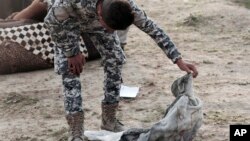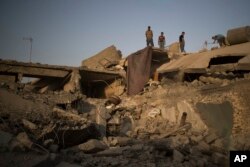Iraq is not capable of trying atrocities committed by Islamic State during the battle for Mosul so it must find other routes to justice such as the International Criminal Court (ICC), a U.N. human rights report said on Thursday.
At least 2,521 civilians were killed during the nine-month battle including 741 people who were executed, the report said.
Most died as a result of Islamic State (ISIL) attacks.
It cited testimonies of mass abductions by Islamic State, as well as killings, the use of human shields, and deliberate targeting of civilians and their homes.
ISIL planted “a huge number” of improvised explosive devices and used drones to drop explosives in Mosul, a city of 1.5 million, as well as setting fire to sulphur fields and oil wells, it said.
Its forces desecrated religious sites and last June blew up the al-Nuri mosque from which its leader Abu Bakr al-Baghdadi had declared the caliphate spanning parts of Iraq and Syria in 2014, it said.
“Iraqi courts and tribunals do not have jurisdiction over international crimes (such as genocide, crimes against humanity and war crimes) — and prosecutors, police investigators and judges lack capacity to ... (investigate), charge and try persons in relation to such crimes,” the report said, calling for it to amend domestic law.
Iraqi law did not do enough to guarantee due process or fair trials, it said.
Accepting the jurisdiction of the Hague-based ICC and finding other ways to ensure crimes were tried by a competent court “would reassure the international community that Iraq is serious” about getting justice, which was key to rebuilding trust and reconciliation, it said.
At least 74 mass graves have been discovered since June 2014 in areas previously held by ISIL in Iraq, the U.N. report said.
These included in Sinjar, the northwestern city where the U.N. has said Islamic State committed genocide against the Kurdish-speaking Yazidi religious minority whom the Sunni militants view as infidels.
Iraq and the international community have a duty to ensure those crimes are prosecuted, Syracuse University professor and former war crimes prosecutor David Crane said on Wednesday in a separate report into the genocide, issued by his law school’s Syrian Accountability Project.
“Bringing ISIS to justice for genocide against the Yazidi community, at the domestic or the international level, will depend on the strategic preservation of forensic evidence,” Crane’s report said.
The U.N. report also called on Iraqi authorities to investigate crimes allegedly committed by Iraqi-backed forces during the operation, including mass abductions and unlawful killings.
It called for a separate investigation into air strikes by the international coalition.
It said the U.N. had recorded 461 civilian deaths from air strikes during the most intensive phase of the battle for western Mosul, from Feb. 19.






